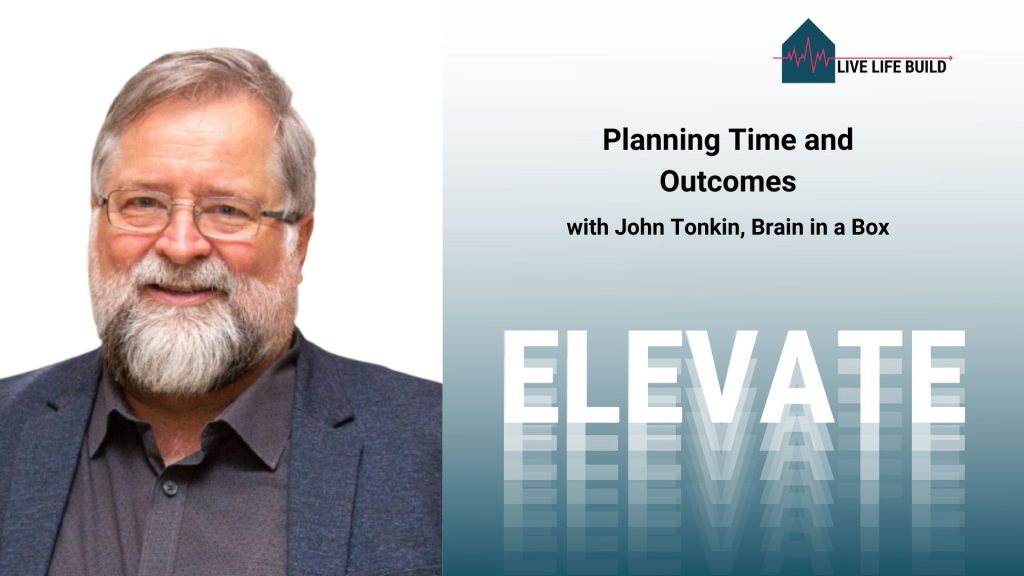How are you planning your time as a builder?
Use systems to achieve your outcomes
Running a successful residential building requires a solid foundation of systems and processes. Our Systems Mentor inside ELEVATE is John Tonkin from Brain in a Box. Here we share an extract from one of his sessions about planning your time so that you are planning your outcomes.
Watch this preview now, and learn more about using systems for planning time and outcomes or read the transcript below.
Let’s start with time, because time is the constant one. It’s the one we all have. Does anyone have more time than anyone else? You know, we hear people say, “oh, mate, you’ve got so much time”.
That’s funny, because I’ve got exactly the same amount of time as you have.
There’s 24 Hours in a Day
Everyone has that 24 hours in a day. Everyone is able to choose to an extent how they spend those hours.
People on a weekend might choose to spend a few more hours going to the pub catching up with mates, watching a video, staying home with the kids, buying a pizza and spending their time a different way, all of those things. But when it comes down to it, every day has 24 hours and every person has the same allotment. Sometimes it goes quicker, or it seems to go quicker, but it actually is just that 24 hours every day.
Everyone will benefit from time that we spend well. So we have those 24 hours, if we spend them well, everyone’s going to benefit. I will benefit from that. And everyone will lose from time spent badly.
Time is that one thing you never get back. You can’t get it back. If you spend your time badly, you can’t say, “hey, give me that, I want to replay it”. You can’t do that unless you’re in Groundhog Day, and that’s only a movie.
So when you benefit, this is the good thing about it. If we use it the right way, we leverage time. When we benefit, often others benefit. So if we do things that use time well, there’s a good chance that it’ll help not just us, the person doing it, but it will help others as well.
And likewise, sadly, when we lose, if we don’t do the right things, we don’t use our time well, if you spend it badly, other people are going to lose out on that as well.
When you’ve got a project that goes pear shaped because it wasn’t planned, or this particular bit wasn’t planned. Well, it’s not just one person who sits there and says, “oh, well, I’ve had a bad day, but everyone else is fine”. No, you can’t because everyone else is impacted by it as well.
Time As a Negative vs Time as a Tool
So I went to everybody’s new friend, chat GPT, and typed in, and I just looked for expressions talking about time in a negative sense. Here’s a sample of what I found:
- time seems to be against me
- time is running out
- time is slipping away
- time is passing you by
- time has been my enemy
- I’ve run out of time
- your time’s up
and so on and so on. And they all talk about time, or those first ones anyway, the first seven, and they all talk about time as if time is an entity or something animated that is working against us.
And a lot of people actually think that way. We have to get that idea that:
time doesn’t happen to us, time is a tool we use.
Time is something that we use, and we choose how we use it. And there’s that choice, which makes the difference. So I think if we’re looking at time, really, the biggest word that comes out of that, the biggest thing that comes out as a concept is it’s time to choose. Time to use how you spend the time.
So the question then is how can I benefit more from the 24 hours I have? So if we all have 24, why are some people more successful in the way they use their time than others? And if there are people who are more successful, what can we do that makes us one of them?
So if I’m thinking in terms of well, how can I benefit more from the 24 hours I have? Then I have got to think, okay, there are two paths I can follow. So the first one is pretty basic, both of them are pretty basic, actually.
If I want to benefit more, then I need to spend more time doing things that contribute to a benefit. And strangely enough, I need to do less, spend less time doing things that contribute to a loss.
And that’s the end of this preview of one of our ELEVATE mentor sessions, our Systems Mentor, John Tonkin.
Want more on this topic?
Check out the following resources:

